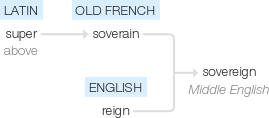Sovereign
Middle English: from Old French soverain, based on Latin super ‘above’. The change in the ending was due to association with reign.
wiktionary
From Middle English sovereyn, from Old French soverain (whence also modern French souverain), from Vulgar Latin *superānus (compare Italian sovrano, Spanish soberano) from Latin super(“above”). Spelling influenced by folk-etymology association with reign. Doublet of soprano, from the same Latin root via Italian. See also suzerain, foreign.
etymonline
sovereign (n.)
late 13c., "superior, ruler, master," from Old French soverain "sovereign, lord, ruler," noun use of adjective meaning "highest, supreme, chief" (see sovereign (adj.)). Meaning "gold coin worth 22s 6d" first recorded late 15c.; value changed 1817 to 1 pound.
sovereign (adj.)
early 14c., "great, superior, supreme," from Old French soverain "highest, supreme, chief," from Vulgar Latin *superanus "chief, principal" (source also of Spanish soberano, Italian soprano), from Latin super "over" (from PIE root *uper "over"). Spelling influenced by folk-etymology association with reign. Milton spelled it sovran, as though from Italian sovrano. Of remedies or medicines, "potent in a high degree," from late 14c.
